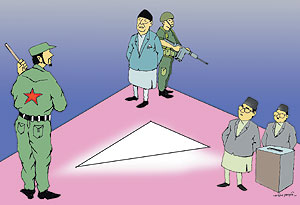 Even Sher Bahadur Deuba's fiercest critics have been forced to accept that he has been surprisingly wily during his second term. When he became prime minister on 24 July, Deuba gave himself one goal and one goal only: find a negotiated solution to the Maoist insurgency. He has tried to keep his word, moving single-mindedly in pursuit of this objective.
Even Sher Bahadur Deuba's fiercest critics have been forced to accept that he has been surprisingly wily during his second term. When he became prime minister on 24 July, Deuba gave himself one goal and one goal only: find a negotiated solution to the Maoist insurgency. He has tried to keep his word, moving single-mindedly in pursuit of this objective. It is a tight-rope walk. The prime minister is under pressure from his own party and the palace-military combine not to be too lenient on the Maoists, but he cannot hurry the underground leadership for fear that its radical wing may splinter off.
That is why he has been looking the other way while the Maoists used the time for extortion, threats and setting up parallel "peoples' governments". He even didn't complain much when the Maoists held on to 69 captured policemen, and gave fiery speeches against the monarchy and constitution. But it is clear now that patience is wearing thin even within Deuba's cabinet. Last week, the Defence Ministry stepped in to fire warning verbal salvos against the Maoists.
As we said in this space last week, the Maoists are also feeling the heat from across the southern border. The Indian foreign minister's strong words against Nepali Maoists, the deployment of 10,000 Indian security forces on the other side of the border to check infiltration, and the sweep of Maoist safe houses in Siliguri must be giving the comrades the feeling that the rug is being pulled away from under them.
While this is going on, everything else is on hold. There is a sense of vapid directionlessness in the ministries. Everyone is waiting for something to happen, but they don't know what. The political limbo has translated into bureaucratic paralysis. One hand of government doesn't know what the other is doing. The Defence Ministry statement against the Maoists comes as a shock to the Home Minister. Other ministers learn of the prime minister's land reform plan over the Radio Nepal bulletin the next morning. Banking sector reforms are stalled. The BPC privatisation is a fiasco. Royal Nepal Airlines is bankrupt. More than 100 parked buses are damaged by mobs in Dang. The National Planning Commission is completely out of the picture.
It is clear that Deuba just can't multitask, and he's not letting anyone else do it. The man is looking after nine ministries-having kept key portfolios like Foreign, Defence, Commerce and Land Reform to himself. The expected reshuffle may spread the load around, but it still will not resolve the potentially divisive issue of Deuba's lack of consultation with his party and cabinet. Party peers say the prime minister is playing with his cards unnecessarily close to his chest, and this has led to speculation about exactly who has his ear. Deuba's cabinet colleagues have publicly complained that there is little team spirit, and privately they have serious fears that the prime minister is isolating himself from advice and feedback.
All this could still be excused. You can't really blame Deuba for keeping things under wraps. After all, Nepali ministers are a garrulous lot and the cabinet is as porous as a sieve. Forget about trying to keep any secrets there, especially sensitive secrets about negotiating strategy. But what cannot be excused is that the drift may result in the government squandering the goodwill it has earned after the truce went into effect and the peace talks began.
Negotiations are not the be all and end all. Talks have to go hand-in-hand with measures to assure the public that the government machinery is still functioning relatively honestly and efficiently, basic services are still being provided, the administration still works. The government cannot think it has hoodwinked the revolutionary women by agreeing to alcohol regulation and doing nothing about it. You can hoodwink some of the people all the time, all the people some of the time, but you can't hoodwink all the people all the time. Sooner or later, they will find out there is nothing they can expect from parliamentary parties and will opt back for the extreme solution.
Even if it is to put pressure on the Maoists to talk seriously and resolve the crisis, Deuba must get his act together. Otherwise the talks will just be an opportunity to let things go from bad to worse. And we all know where that will take us


